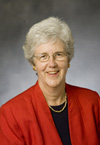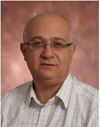
Keynote speakers
Session 1: School accountability through performance monitoring
 Helen Ladd, Duke University
Helen Ladd, Duke University
Helen F. Ladd is the Edgar Thompson Professor of Public Policy Studies and Professor of Economics at Duke University. Most of her current research focuses on topics in education policy including school accountability, parental choice and market-based reforms, charter schools, school finance, and teacher labor markets. With Edward Fiske, she is the editor of The Handbook of Research on Educational Finance and Policy (Routledge, 2008) and has recently written books on school choice in New Zealand and school reform in post-apartheid South Africa. She is the immediate past president of the Association for Public Policy Analysis and Management and is a member of the National Academy of Education. Abstract Pdf
 Ludger Woessmann, Ifo Institute, University of Munich
Ludger Woessmann, Ifo Institute, University of Munich
Ludger Woessmann is Professor of Economics at the University of Munich and Head of the Department Human Capital and Innovation at the Ifo Institute. He received his PhD from the University of Kiel and worked at the Kiel Institute for World Economics. He held a 2010 National Fellowship at the Hoover Institution at Stanford University and spent extended research visits at Harvard University and the National Bureau of Economic Research. His main research interests are in the economics of education, growth, and history, with a special focus on efficiency and equity of education systems, economic consequences of education, and microeconometric analyses of international student achievement tests (PISA, TIMSS, PIRLS, IALS). His about 200 academic publications include many articles in leading international journals like the Quarterly Journal of Economics and the Journal of Economic Literature and are regularly covered by the national and international media. Woessmann is co-editor of the recent volumes of the Handbook of the Economics of Education (North-Holland). He served on the Questionnaire Expert Group for PISA cycles 2009 and 2015 and co-authored (with Eric A. Hanushek, Stanford University) the 2010 OECD report The High Cost of Low Educational Performance: The Long-Run Economic Impact of Improving PISA Outcomes. He is Fellow of the International Academy of Education and coordinates the EU-funded European Expert Network on the Economics of Education (EENEE), a forum to promote and disseminate research on the Economics of Education in Europe. Abstract Pdf
Session 2: Improving teacher and administrator quality
 Jane Hannaway, American Institutes of Research
Jane Hannaway, American Institutes of Research
Dr. Hannaway is Vice President, the American Institutes of Research, and Director of CALDER (National Center for the Analysis of Longitudinal Data in Education Research) She was formerly Senior Fellow and founding Director of the Education Policy Center at the Urban Institute.
Hannaway is an organizational sociologist whose work focuses on educational organizations, in particular the effects of education reforms on school policies and practices and ultimately on student outcomes. Her current research is heavily focused on issues associated with teacher labor markets and education accountability policies. She is beginning new work estimating the payoffs of secondary and postsecondary experiences on education attainment and labor market outcomes of students.
Dr. Hannaway previously served on the faculty of Columbia, Princeton, and Stanford Universities. She was also a senior researcher with the Consortium for Policy Research in Education (CPRE). Dr. Hannaway has authored or co-authored/edited seven books and numerous papers in education and management journals. She is twice a past vice-president of the American Education Research Association (AERA) and also served as a member of the Executive Board. Hannaway was also on the Council of the Association for Public Policy and Management (APPAM) and the Executive Board of the American Education Finance Association. She is on the editorial board of a number of journals, and was editor of Educational Evaluation and Policy Analysis, the main policy journal of the American Educational Research Association. She served on the NCLB Commission tasked to provide recommendations for reauthorization. Hannaway was recently elected President of the Association for Education Finance and Policy (AEFP). She is a frequent commentator on education issues in op-eds, radio, television and other public forums. She received her Ph.D. from Stanford University. Abstract Pdf
 Leonidas Kyriakides, University of Cyprus
Leonidas Kyriakides, University of Cyprus
Dr Leonidas Kyriakides is Professor in Educational Research and Evaluation at the University of Cyprus. His field of research and scholarship is the evaluation of educational effectiveness, whether of teachers, schools or educational systems. Currently his research agenda is concerned with the development of a dynamic model of educational effectiveness, and the application of effectiveness research to the improvement of educational practice. He is a member of the editorial board of several international journals with review process and the chair of the EARLI SIG on Educational Effectiveness. He acted as chair of the AERA SIG on School Effectiveness and Improvement and as a board member of the International Congress on School Effectiveness and Improvement. Finally, he is the author of more than 100 research papers in refereed journals, 6 books and 80 chapters in books. Abstract Pdf
Session 3: Promising innovations inside and outside the classroom
 Jean Francois Rouet, Digital information literacy
Jean Francois Rouet, Digital information literacy
Jean-François Rouet is a Senior research scientist with the French Centre National de la Recherche Scientifique (National Center for Scientific Research). His research focuses on human cognition, literacy and information technology. Dr. Rouet’s work aims at understanding how people become skilled users of complex information systems, including printed and electronic documents. He contributes to international scholarly journals, and has authored or edited several books (examples include "The Skills of Document Use: From Text Comprehension to Web-based Learning", 2006, Erlbaum, and “Understanding Multimedia Documents” (with R. Lowe and W. Schnotz, 2008, Springer). Dr. Rouet currently serves as associate editor of the journal Learning and Instruction, and as editorial board member for several other academic journals. He also serves as an expert consultant with the French Ministry of Education and with the OECD's PISA and PIAAC programs. A former director of the Center for Research on Cognition and Learning at the University of Poitiers (2004-2011), he teaches in various graduate programs. He is a member of the French Psychological Society, the European Association for Research on Learning and Instruction (EARLI), and the Society for Text and Discourse (STD). After receiving a doctorate in Psychology from the University of Poitiers (France) in 1991, Dr. Rouet has spent several years at the Learning Research and Development Center (Pittsburgh, USA) and at the Institute for Research on Informatics and Automation (Grenoble, France). Abstract Pdf
 Kentaro Yamamoto, ETS
Kentaro Yamamoto, ETS
Kentaro Yamamoto is a deputy director/principal research scientist for the Center for Global Assessment at Educational Testing Service (ETS). He obtained his Ph.D. in educational psychology and his M.S. in statistics—both from the University of Illinois. He has been a technical advisor for OECD and Department of Education of USA. He has designed or contributed in designing numerous national and international large scale surveys of various subject domains for adults as well as for special populations such as NAEP, TIMMS, PISA, IALS, ALL, and PIAAC for 25 years. He developed many of analyses rocedures for these surveys. He also designed several individual tests in reading, and literacy. He developed a Psychometric model called "Hybrid", a mixture model of continuous and discrete measurement models for diagnostic testing as well as IRT scaling as has been used for all literacy surveys at ETS. The model has been used for studying speededness of test and diagnostic evaluations. He also designed the online testlet adaptive testing for Prose, Document and Quantitative adult literacy skills. He has written numerous reports, research papers, technical reports, contributed chapters in multiple books and has given numerous presentations at the national and international conferences. Abstract Pdf
Session 4: Building and interpreting scientific evidence
 Roel Bosker, GION, University of Groningen
Roel Bosker, GION, University of Groningen
Prof.dr. Roel J. Bosker (1955) is full professor of education and director of GION, the Groningen Institute for Educational Research at the University of Groningen. He was expert-advisor to the OECD-secretariat for Learning for Tomorrow’s World (PISA-2006), and is currently member of the Technical Advisory Group for OECD-PIAAC – Program for the International Assessment of Adult Competencies. He has been visiting professor to Melbourne University (Australia), Syracuse University (New York, USA), and Nuffield College (Oxford University, UK). He is co-editor of the SSCI-rated journal School Effectiveness and School Improvement. He is co-author of the books The foundations of educational effectiveness and Multilevel Analysis. An introduction to basic and advanced multilevel modelling (2nd ed.). Abstract Pdf
.jpg) Russ Whitehurst, The Brookings Institution
Russ Whitehurst, The Brookings Institution
Russ Whitehurst is the Brown chair, senior fellow, and director of the Brown Center on Education Policy at the Brookings Institution, where he is responsible for shaping public and political opinion on education policy based on findings from research. As the first director of the Institute of Education Sciences within the U.S. Department of Education, he is widely acknowledged to have had a transforming effect on the quality of education research. In his earlier career as a professor of developmental psychology he carried out seminal research on early literacy, language development, and preschool education. A program he developed to enhance language development in children from low-income families, Dialogic Reading, is used in preschools around the world. He is a pioneer in delivering college-level instruction through the internet, in recognition of which he received the Microsoft Innovators in Higher Education Award. Abstract Pdf
Social dinner. Dinner speech
 Elizabeth King, World Bank
Elizabeth King, World Bank
Elizabeth M. King is Director of Education in the Human Development Network of the World Bank. In this position, she is the World Bank's senior spokesperson for global policy and strategic education issues in developing countries. Until January 2009, she was a manager in the Bank's research department, heading the team that focuses on human development issues. She has published on topics such as household investments in human capital; the linkages between education, poverty and economic development; gender issues in development, especially women's education; education finance, and the impact of decentralization reforms. Since joining the World Bank, she has worked on countries as diverse as Bangladesh, Colombia, Ghana, Indonesia, Nicaragua, Pakistan, and the Philippines, among others, contributing to public expenditure reviews, country economic assessments, policy analyses of the human development sectors, and impact evaluations of policies and programs. She was the Lead Economist for the Bank's human development department for East Asian countries for three years, and was a co-author of three World Development Reports. Ms. King has a Ph.D. in economics from Yale University and a BA from the University of the Philippines
Aperitivo speech – in video link from Harvard University
 Raj Chetty, Harvard University
Raj Chetty, Harvard University
Raj Chetty is a Professor in the Economics Department at Harvard University. Chetty received his Ph.D. from Harvard in 2003 and joined the faculty of Berkeley as an Assistant Professor at the age of 23. He was granted tenure at Berkeley in 2007 and moved to Harvard in 2009. Chetty serves as Co-Director of the Public Economics Program at the National Bureau of Economic Research and Editor of the Journal of Public Economics.
Chetty has published papers in leading journals on a wide range of topics related to government policy. He has studied the effects of risk on households and their implications for social welfare policy. He has also studied the effects of dividend taxation on corporate behavior. Most recently, his research has focused on the importance of salience and attention in understanding the effects of government policies on the economy. These studies have been cited in media outlets including the New York Times, Wall Street Journal, and Business Week, as well as in Congressional testimony.
Chetty has been awarded three National Science Foundation grants for his research, including most recently a CAREER award, the NSF’s most prestigious grant for young researchers. He was award the 2008 American Young Economist award and an Alfred P. Sloan Research Fellowship. He was recently named one of the “top young economists doing work on real-world problems” in the New York Times and one of the best young economists of the past decade by the Economist magazine.


